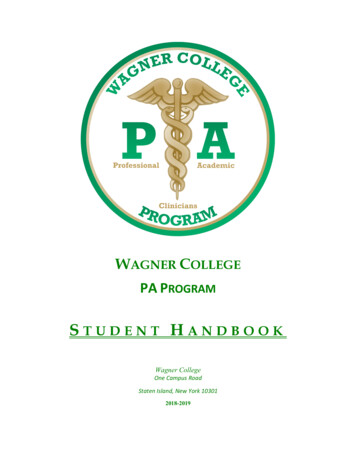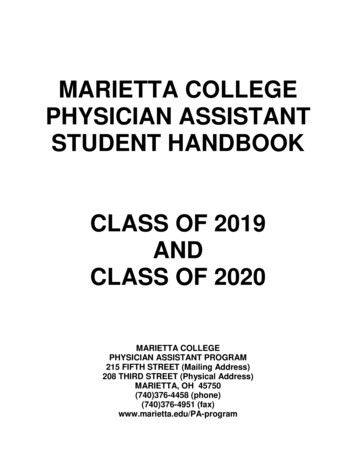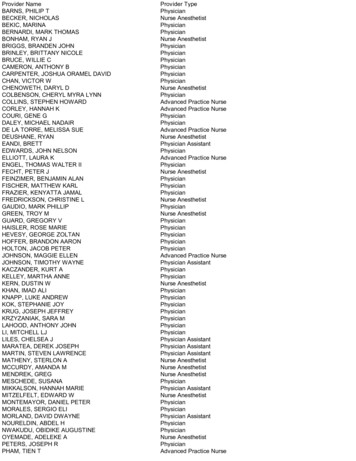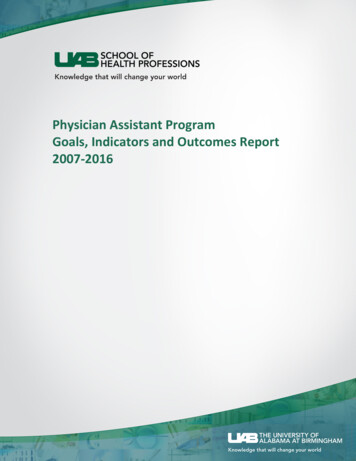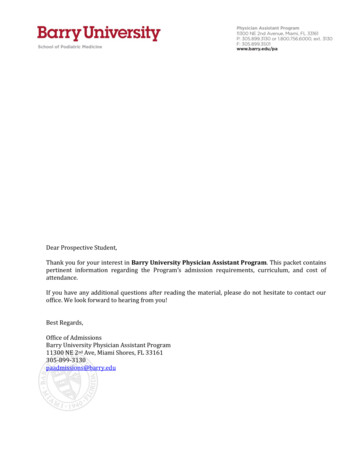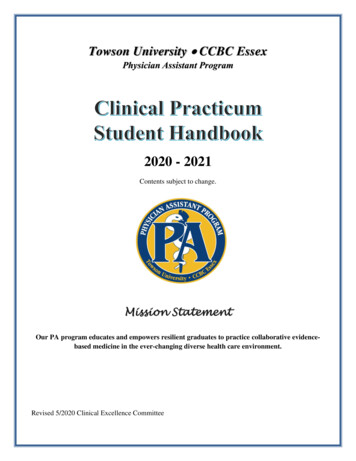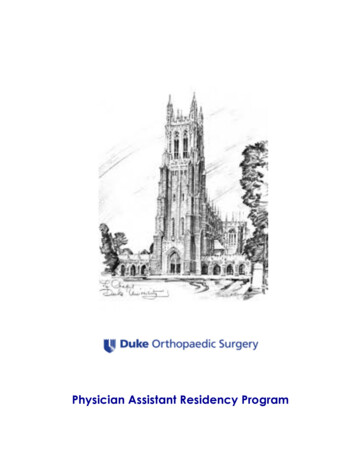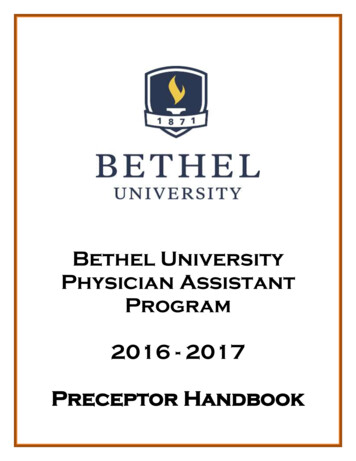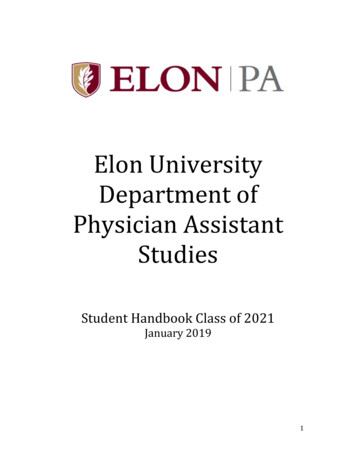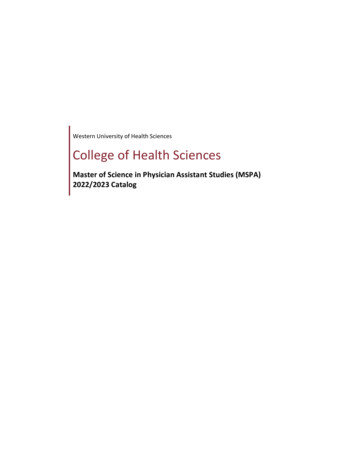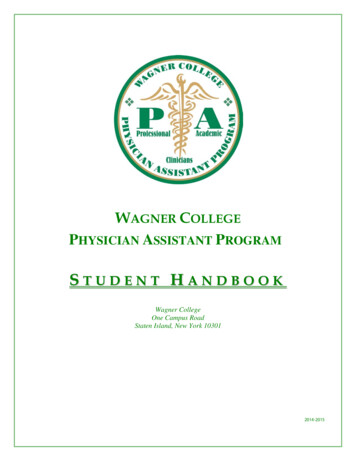
Transcription
WAGNER COLLEGEPHYSICIAN ASSISTANT PROGRAMSTUDENT HANDBOOKWagner CollegeOne Campus RoadStaten Island, New York 103012014-2015
WAGNER COLLEGE PHYSICIAN ASSISTANT PROGRAM STUDENT HANDBOOKT AB L E OF C ONT E NT SC ONT E NT SMission StatementPA G E1-2Code of Ethics3History of the Program4Physician Assistant (PA) Role5Program Contact Names6Calendar7Program Overview8-9Goals & Objectives of the Program10-14Technical Standards15-16Policies & Procedures17-31Didactic Phase -(Year I)32-35Clinical Phase -(Year II)36-37Graduate Phase - (Year III)38Course Descriptions39-49Required Medical Textbooks50-53Required Medical Equipment54Graduation Procedures55Declaration of Understanding56
WAGNER COLLEGE PHYSICIAN ASSISTANT PROGRAM STUDENT HANDBOOKMISSION STATEMENTT o pr epar e pr of essi onal academi c cl i ni ci anscommi tted to pr ovi di ng qual i ty heal th car eto al l i ndi vi dual s.Page 1 of 56
WAGNER COLLEGE PHYSICIAN ASSISTANT PROGRAM STUDENT HANDBOOKPHYSICIAN ASSISTANT PROGRAMMISSION STATEMENTTo prepare professional academic clinicianscommitted to providing quality health care to all individuals.The curriculum of the PA Program is based on defined objectives for achieving the academicknowledge, clinical skills and professional values reflective of the PA profession.Each of the three (3) professional phases or years encompasses all 3 tenets but each of the years isdedicated as representative of one of the tenents.Professional Year I (Didactic Phase) emphasizes instruction of academic medicalknowledge.Professional Year II (Clinical Phase) focuses on student-patient interactions and themastering of clinical skills.Professional Year III (Graduate Phase) is dedicated to advanced clinical clerkship,medical research projects and professional credentialing requirements.The summative evaluation and the exit interview reflect on the meeting of all objectives anddemonstrate fulfillment of the mission statement.Page 2 of 56
WAGNER COLLEGE PHYSICIAN ASSISTANT PROGRAM STUDENT HANDBOOKCode of Ethics of thePhysician Assistant ProfessionPhysician Assistant shall be committed to providing competent medical care, assuming as their primaryresponsibility the health, safety, welfare, and dignity of all humans.Physician Assistant shall extend to each patient the full measure of their ability as dedicated, empathic healthcare providers and shall assume responsibility for skillful and proficient transactions of their professional duties.Physician Assistant shall deliver needed health care services to health consumers without regard to sex, age,race, creed, socio-economic and political status.Physician Assistant shall adhere to all state and federal laws governing informed consent concerning thepatient’s health care.Physician Assistants shall seek consultation with their supervising physician, other health providers, or qualifiedprofessionals having special skills, knowledge, or experience whenever the welfare of the patient will besafeguarded or advanced by such consultation. Supervision should include ongoing communication between thephysician and the physician assistant regarding the care of all patients.Physician Assistants shall take personal responsibility for being familiar with the adhering to all federal/statelaws applicable to the practice of their profession.Physician Assistants shall provide only those services for which they are qualified via education and/orexperiences and by pertinent legal regulatory process.Physician Assistants shall not misrepresent in any manner, either directly or indirectly, their skills, training,professional credentials, identify, or services.Physician Assistants shall uphold the doctrine of confidentiality regarding privilege patient information,unless required to release such information by law or such information becomes necessary to protect thewelfare of the patient or the community.Physician Assistant shall strive to maintain the increase quality of individual health care services throughindividual study and continuing education.Physician Assistants shall have the duty to respect the law, to uphold the dignity of the physician assistantprofession, and to accept its ethical principles. The physician assistant shall not participatein or conceal any activity that will bring discredit or dishonor to the physician assistant profession and shallexpose, without fear or favor any illegal or unethical conduct in the medical profession.Physician Assistants, ever cognizant of the needs of the community, shall use the knowledge and experienceacquired as professionals to contribute to an improved community.Physician Assistants shall place service before material gain and must carefully guard against conflicts ofprofessional interest.Physician Assistants shall strive to maintain a spirit of cooperation with their professional organizations and thegeneral public.Page 3 of 56Membership in the Academy is an honor that confers upon the individual certain rights and responsibilities.Adherence to the AAPA Code of Ethics is a condition of members.
WAGNER COLLEGE PHYSICIAN ASSISTANT PROGRAM STUDENT HANDBOOKPA Profession: A Historical Perspective1965First formal program for training PAs was established at Duke University.1968The AAPA (American Academy of Physician Assistants), the national professional organization was formed.1971The AMA’s House of Delegates approved the Essentials of an Approved Educational Program for the Assistant tothe Primary Care Physician. A set of standards for physician assistant programs.1972The Association of Physician Assistant Programs (APAP) was created.1973First national PA certifying exam is given by the National Board of Medical Examiners.1974The newly organized National Commission for the Certification of Physician Assistants (NCCPA) assumedresponsibility for administering the National Certifying Examination.1976Committee on Allied Health Education and Accreditation is established as an independent organizationresponsible for accrediting Allied Health Educational Programs (including PA Programs).1977Passage of Rural Health Clinic Services Act that required utilization of a mid-level practitioner (PAs, NursePractitioners and Nurse Midwives). This act provided Medicare reimbursement for PA services in certified ruralhealth clinics.1979PAs are employed in all 50 states.1987PA services are reimbursable under Medicare (Part A).1991PAs are commissioned officers in all branches of the military.1992PAs have privileges in thirty-three states. Approximately 21,000 practicing PAs in the USA1996Wagner College Staten Island University Hospital Physician Assistant Program received ProvisionalAccreditation (April 4, 1996) and admitted its first class of physician assistant students.1997The number of PA Programs surpassed 100. Approximately 30,000 practicing PA’s are in the American healthworkforce.1998The Commission on Accreditation (CAAHEP) certified that Wagner College Staten Island University HospitalPhysician Assistant Program had completed an accreditation review and was judged to be in compliance with thenationally established standards. The first class of the Wagner College Staten Island University HospitalPhysician Assistant Program graduated on June 1998.2000The ARC-PA (Accreditation Review Commission on Education for the PA, Inc.) granted the PA ProgramContinuing Accreditation for five years.2002Wagner College was accredited by New York State Department of Higher Education to offer a graduate programfor practicing physician assistants wishing to receive a Master of Science degree in Advanced Physician AssistantStudies.2005The Wagner College Physician Assistant Program transitioned to a three (3) year professional program offering itsgraduates the Master of Science in Advance PA Studies.ARC-PA granted Continuing Accreditation to the Wagner College Physician Assistant Program until 2008.2008ARC-PA granted Continuing Accreditation to the Wagner College Physician Assistant Program until 2011.2011ARC-PA granted Continuing Accreditation to the Wagner College Physician Assistant Program until 2016.2012ARC-PA extended Continuing Accreditation to the Wagner College Physician Assistant Program until 2018.Page 4 of 56
WAGNER COLLEGE PHYSICIAN ASSISTANT PROGRAM STUDENT HANDBOOKPhysician Assistant (PA) RoleW hat ar e Physician A ssistants?PhysicianA ssistantsar ehealthpr ofessionals licensed to pr actice medicinewith physician super vision.PhysiciansA ssistants ar e qualified by gr aduation fr om anaccr edited physician assistant educationalpr ogr am and/or cer tification by the NationalC ommission on C er tification of PhysicianA ssistants.W ithin the physician/PAr elationship, physician assistants exer ciseautonomy in medical decision-making andpr ovide a br oad r ange of diagnostic andther apeutic ser vices.T he clinical r ole ofphysician assistants includes pr imar y andspecialty car e in medical and sur gical pr acticesettings in r ur al and ur ban ar eas. Physicianassistant pr actice is center ed on patient car eand may include educational, r esear ch andadministr ative activities.PA s Pr actice M edicinePhysician A ssistants follow a medicalmodel of patient car e and pr actice medicinewith super vision by licensed physicians. APA ’ s specific duties ar e defined by stater egulations and pr actice setting, but includeboth diagnostic and ther apeutic pr ocedur es.PA education also pr epar es PhysicianA ssistants to deal with many medicalemer gencies. PA s often act as fir st or secondassistants in major sur ger y, and pr ovide pr eand post-oper ative car e.I n some r ur al ar eas, wher e physiciansar e in shor t supply, PA s ser ve as the onlypr ovider s of healthcar e, confer r ing with theirsuper vising physicians and other medicalpr ofessionals as needed and r equir ed by law.Over viewT he r elationship between a physicianand a physician assistant is one of mutual tr ustand r eliance. T he PA ’ s r esponsibilities dependon the type of pr actice, his or her exper ience,the wor king r elationship with the physicianand other healthcar e pr ovider s, and state laws.E ducated in a medical pr ogr am, PA s ar equalified to per for m appr oximately 80 per centof the duties most commonly done by pr imar ycar e physicians.PA s per for m physicalexaminations, diagnose and tr eat illnesses,or der and inter pr et lab tests, sutur e wounds,set fr actur es, and assist in sur ger y. I n amajor ity of states, PA s wr ite pr escr iptions.Page 5 of 56
P R OG R A M C ONT A C T NA M E SPROGRAM DIRECTORNora Lowy, PhD, MPA, PA-CMEDICAL DIRECTORBrahim Ardolic, MDACADEMIC COORDINATORDiane Pane, MPA, PA-CACADEMIC COORDINATORRobert Marchese, MS, PA-CCLINICAL COORDINATORGail Tiburzi, MPA, PA-CCLINICAL COORDINATORAustin Epstein, PA-CGRADUATE COORDINATORJenny Sena, MS, PA-CGRADUATE COORDINATORMichael Rota, MS, PA-CGRADUATE COORDINATORCarol Galarza, MS, PA-CFACULTYTara Igneri, MS, PA-COFFICE MANAGERLinda MorrisMANAGER OF SIMULATION LAB& INTERNATIONAL CLINICALEXPERIENCESKrystal Cromeyer, MBAOffice: 718-420-4552Cell: 917-940-4500Email: nora.lowy@wagner.eduOffice: 718-226-9158Email: bardolic@nshs.eduOffice: 718-420-4553Email: diane.pane@wagner.eduOffice: 718-420-4153Email: robert.marchese@wagner.eduOffice: 718-420-4160Email: gail.tiburzi@wagner.eduOffice: 718-420-4554Email: austin.epstein@wagner.eduOffice: 718-420-4555Email: jenny.sena@wagner.eduOffice: 718-420-4153Email: michael.rota@wagner.eduOffice: 718-420-4555Email: carol.galarza@wagner.eduOffice: 718-420-4556Email: tara.igneri@wagner.eduOffice: 718-420-4142Email: linda.morris@wagner.eduOffice: 718-420-4151Email: krystal.cromeyer@wagner.eduPage 6 of 56
WAGNER COLLEGE PHYSICIAN ASSISTANT PROGRAM STUDENT HANDBOOKC AL E NDARS c h ol a s t i c S c h ed u l e 2 0 1 4 - 2 0 1 5Didactic, C linical & G r aduate PhasesPlease note the schedule for the upcoming semesters:Summer ’14– Spring ’15:OrientationMay 29, 2014DaySummer ‘14Fall ‘14Spring ‘15VacationJune 2, 2014 – May 13, 20158 wksJune 2 – July 28, 2014Summer – Didactic Lecturers & Labs1 wkJuly 29 – August 4, 2014Reading Days, Make-Ups/Final Exams(1 wk)(August 5- August 10, 2014)(Vacation)16 wksAugust 11– December 2, 2014Fall – Didactic Lecturers & Labs1 wkDecember 3 – December 10, 2014Reading Days, Make-Ups/Final Exams(5 wks)(December 11– January 4, 2015)(Vacation)16 wksJanuary 5 – May 4, 2015Spring – Didactic Lecturers & Labs(1 wk)(March 2 – March 8, 2015)(Vacation)1 wkMay 5 – May 13, 2015Reading Days, Make-Up/Final Exams(3 wks)(May 14 – June 7, 2015)(Vacation)July 4, 2014Independence DaySeptember 1, 2014Labor DayOctober 13, 2014Columbus DayNovember 27-28, 2014Thanksgiving WeekendJanuary 19, 2015Martin Luther King DayFebruary 16, 2015President’s DayApril 2 – 6, 2015Easter/Passover WeekendPage 7 of 56
WAGNER COLLEGE PHYSICIAN ASSISTANT PROGRAM STUDENT HANDBOOKW a g n e r C o l l e g e P h y s i c i a n A s s i s t a n t P r ogr a mProgram OverviewMissionThe mission of the three-year BS/MS Physician Assistant Program is to prepare professionalacademic clinicians, committed to providing quality health care to all individuals.Program OverviewThe Wagner College Physician Assistant Program is accredited by the New York StateDepartment of Education and the ARC-PA (Accreditation Review Commission on Education forthe Physician Assistant).The Wagner College Physician Assistant Program is committed to preparing future professionalspossessing sound academic knowledge and proficiency in clinical skills, requisite for providingand promoting quality healthcare to all individuals. The program is dedicated to the advancementof physician assistant education, promotes service to the community and, emphasizes theacquisition of the knowledge and skills required of the physician assistant (PA) functioning in adynamic healthcare environment.The three-year BS/MS Program in Physician Assistant Studies is a comprehensive program ofdidactic (academic), clinical and research (graduate) work that reflects upon the academic,clinical, and professional skills required of the PA. Students completing the prescribed three-yearprogram in physician assistant studies receive their BS and MS degrees and are eligible to takethe national certifying examination leading to the title of Certified Physician Assistant (PA-C).The Didactic Phase (Year I) includes classroom and laboratory instruction in courses such as theMedical Sciences (Clinical Anatomy, Medical Physiology, Medical Microbiology,Pathophysiology and Human Genetics); Clinical Preparatory Sciences (Patient Assessment,Radiology Interpretation, Primary Care & Pharmacotherapeutics, General Medicine, Emergency& Surgical Medicine and Maternal & Child Medicine); and PA Professional Practice. Clinicalexposure begins in the didactic phase of the program by providing for experiences with interviewskills and performance of physical examinations in a variety of clinical settings. That clinicalexposure extends into the Clinical Phase (Year II) with the introduction of supervised clinicalexperiences and is further developed in the Graduate Phase (Year III) with elective clerkships.Page 8 of 56
WAGNER COLLEGE PHYSICIAN ASSISTANT PROGRAM STUDENT HANDBOOKThe structured Clinical Phase takes place at affiliated clinical institutions - hospitals, outpatientclinics, private offices and other in-state and out-of-state sites. The Clinical Phase providesstudents with full-time, direct patient care in outpatient, inpatient, long-term care and emergencysettings. The clinical experiences are intensive, supervised, hands-on learning experiences invarious medical and surgical areas. These supervised clinical rotations are in disciplines such asemergency medicine, general and advanced practice medicine; general and advanced practicepediatrics; general and advanced practice surgery; long term care; primary care (from adolescentto community health), psychiatry/behavioral medicine, and women’s health. All clinicalexperiences emphasize the provision of diagnostic, therapeutic and health maintenance services.Graduate level courses are introduced in the second year of the program and continued with in thethird year or Graduate Phase to fulfill the requirements for the Master of Science degree. Thesecourses provide the Physician Assistant with the knowledge and skills required for professionaland career development. In keeping with the philosophy of PA education, the graduate phaseconsists of didactic coursework that is complemented with clinical experiences including theelective clerkships.Clerkship experiences are available in elective clinical areas of unique interest to each student.Examples include the surgical subspecialties (burn unit, cardiothoracic surgery, ENT surgery,neurosurgery, orthopedics, plastic surgery, urology, surgical intensive care trauma and urology);forensic medicine; women’s health; family practice; medical subspecialties (cardiology,dermatology, electrophysiology, gastroenterology, hematology-oncology, infectious disease,neurology and pain management) and community medicine. For those interested in pursuingeducation or administrative ventures, clerkships can be set up in those areas, as well.The requirements for the Master of Science include the development of a research thesis project.The proposal for the thesis must be approved by the department and either the hospital IRB(Institutional Review Board) or college HERB (Human Experimental Review Board) prior to itsimplementation. The final thesis, approved by the Research Committee, is presented at PosterPresentations and defended at the Annual Research Forum.Upon completion of the Physician Assistant Program, students are awarded a Bachelor of Scienceand Master of Science in Advanced PA Studies from Wagner College and a PA Certificate ofCompletion as well as a certificate acknowledging the Research Thesis Project from the WagnerCollege PA Program. Certification for clinical practice is granted by passing the PANCE(Physician Assistant National Certifying Exam). Registration and licensure are under thesupervision of each state.Page 9 of 56
WAGNER COLLEGE PHYSICIAN ASSISTANT PROGRAM STUDENT HANDBOOKG OAL S & OBJ E C T I V E SG OA L S OF T H E PR OG R A MThe goals of the Wagner College Physician Assistant Program are to I. Integrate the three tenets of academic knowledge, clinical skills andprofessionalism into a comprehensive curriculum encompassing courses in themedical sciences, clinical preparatory sciences and professional practice.II. Facilitate through a sequential, ‘building block’ curriculum, the acquisition ofknowledge relevant to clinical practice.III. Provide learning experiences that will promote the development of criticalthinking and medical decision making skills.IV. Enhance clinical competencies by providing experiences in a spectrum ofsettings with patients across the lifespan requiring varying aspects of patientcare.V. Guide the development of professionally relevant research projects leading tothe dissemination of findings at public forums and at a thesis defense.The program defines its success by demonstrating the achievement of the above goals.OB J E C T I V E S OF T H E PR OG R A MThe Wagner College PA Program aims to provide a comprehensive program that integrates theacademic, clinical and professional components that will prepare the Physician Assistant toperform as a competent professional and provider of quality care.The Program maintains an on-going qualitative assessment in order to implement that which isnecessary to meet or exceed the standards outlined in the “Accreditation Standards for PhysicianAssistant Education”.The Program has set forth objectives that will prepare students to perform functions and tasksexpected of a physician assistant with competency and proficiency.Objective #1:The graduate will achieve knowledge and skills in history taking andperforming physical examinations.1.1 Develop a rapport with the patient and family that will enhance thehistory taking procedure.1.2 Obtain and record a complete and accurate history: Chief Complaint Family History History of Present Illness Review of Systems Past Medical History Psychosocial History Current Health StatusPage 10 of 56
WAGNER COLLEGE PHYSICIAN ASSISTANT PROGRAM STUDENT HANDBOOK1.3 Perform a complete and thorough physical examination.a. Demonstrate appropriate methods for developing patientconfidence and trust during the physical examination.b. Carry out a comprehensive systematic physical exam.General SurveyVital SignsSkin, Hair & NailsHEENTThorax & LungsCardiovascularc.AbdomenBreast & AxillaeGenitaliaMusculoskeletalPeripheral VascularNeurologicalDistinguish normal from abnormal physical examinationfindings.d. Use the following instruments effectively and safely incollecting health status data: Objective pe Tuning ForkReflex hammerMeasuring TapeOther portable and/oroffice based devicesThe graduate will achieve the knowledge and skills required for assessinglaboratory and diagnostic studies.2.1. Formulate a problem list and/or a differential diagnosis for eachpatient complaint.2.2. Identify the appropriate diagnostic tests and procedures indicated indetermining the correct diagnosis.2.3. Discuss with the patient the benefits and risks associated with thediagnostic tests and procedures.2.4. Demonstrate the appropriate skills required in collecting routinespecimens including but not limited to the following: Bacteriological samplesBlood (arterial, capillary, venous)Gastric contentsSpinal fluidSputumStool samplesSynovial samplesUrethral smears/culturesUrine samplesPage 11 of 56
WAGNER COLLEGE PHYSICIAN ASSISTANT PROGRAM STUDENT HANDBOOK2.5. Interpret the results and discuss the implications of basic laboratorytests, including but not limited to the following: Automated Blood & Serum Chemistry PanelsComplete Blood Count with DifferentialComplete UrinalysisCultures & Sensitivities of various specimensErythrocyte Sedimentation Rate & C-Reactive ProteinsGram Stains of various specimensPregnancy TestsStool for Occult Blood, Ovum, and ParasitesVaginal & Cervical specimen analysis2.6. Take and Interpret: EKG Rhythm Strips 12 Lead EKGs2.7. Identify and interpret common blood gas disorders: Metabolic Acidosis & AlkalosisRespiratory Acidosis & AlkalosisSecondary acid-base disordersPulmonary Function Tests2.8. Order and perform basic interpretations of radiological studies ofthe chest, abdomen, pelvis, skull and extremities.2.9. Understand the uses of the following imaging modalities: Objective #3:AngiographyBronchoscopyCT ScansColonscopyEchocardiography EndoscopyFluoroscopyMRINuclear Medicine StudiesUltrasoundThe graduate will achieve the knowledge and skills in formulating the mostlikely diagnoses.3.1. Utilize problem solving and medical decision making skills.3.2 Integrate history, physical, laboratory and other findings to develop anappropriate differential diagnosis.Objective #4:The graduate will achieve knowledge and skills in clinical intervention.4.1 Perform clinical interventions appropriate for patient needs.4.2 Carry out appropriate clinical techniques. (See “Procedure List”)4.3 Understand the indications and possible complications of clinicalinterventionsPage 12 of 56
WAGNER COLLEGE PHYSICIAN ASSISTANT PROGRAM STUDENT HANDBOOKObjective #5:The graduate will achieve the knowledge and skills relevant to clinicaltherapeutics.5.1. Identify, and where appropriate, order medications used in thetreatment of common health conditions,5.2. Demonstrate knowledge of drugs to include indications,contraindications, mechanisms of action, and side effects.5.3. Understand the challenges or difficulties patients may have incomplying with prescribed treatment regimens.5.4. Recognize the rights of patients to be informed regarding natureand choices of treatment, costs, risks vs. benefits and availableresources.Objective #6:The graduate will achieve the knowledge and skills relevant to healthmaintenance.6.1 Communicate effectively and professionally within a patientcentered health care team with patients, their families and otherhealth care personnel.6.2 Teach/counsel patients regarding the diagnosis, prognosis andtreatment in an understanding and professional manner.6.3 Teach patients about self-breast examinations, self-testicularexaminations, and skin cancer examinations.6.4 Teach, counsel, inform, and assist with understanding andpreparation of advance directives and with the designation of ahealth care proxy.6.5 Demonstrate professional concern regarding the effects that healthproblems have on the patient/family structure and lifestyles.6.6 Develop an objective perspective that will allow appropriate andsupportive therapeutic intervention into the patient’s healthproblems.6.7 Understand and discuss the effects of the physical, psychological,sociocultural and economic factors relating to the patient’s healthstatus on the patient and family.6.8 Utilize patient/family education in providing the knowledgeneeded to maximize the health status of the patient.6.9 Demonstrate professional discretion in protecting the right of thepatient to privacy and confidentiality of privileged information.Page 13 of 56
WAGNER COLLEGE PHYSICIAN ASSISTANT PROGRAM STUDENT HANDBOOKObjective #7:The graduate will achieve the knowledge and skills for applying clinically thelearned and acquired scientific concepts.Objective #8:The graduate will demonstrate application of knowledge and skillscorresponding to the following systems: lGenitourinaryHematologicInfectious naryReproductiveTo fulfill the above objectives, it is required that the student log all patient encounters andrequired procedures. The student is required to complete and document a minimum of 1000patient encounters over the 2 years of supervised clinical experiences and clerkships. Meeting therequirement will necessitate the logging of patients during each of the supervised clinicalexperiences in a timely manner. The student is also expected to document the successfulperformance of all required procedures. Students who fail to meet the minimum of 1000 patientencounters and the required procedures will be ineligible for graduation.PROC E DUR EPROCEDUREMINIMUMREQUIREMENTLI STPROCEDUREMINIMUMREQUIREMENTACLS1Incision & drainage1Anterior Nasal Packing1Intradermal injection3Arterial Puncture6NG tube placement3BCLS1Pelvic exam/PAP smear6Chest Tube irrigation/removal1Peripheral IV12Dressing Change/Wound Care6Perform CPR1Ear Care1Subcutaneous injection3EKG3Staple/suture removal6Eye Care1Suturing6Gastric Lavage3Urinary Catheter 6IM Deltoid/Gluteal Injections6Urinary Catheter 6Immobilization/Splinting/Casting6Venous Puncture6Page 14 of 56
WAGNER COLLEGE PHYSICIAN ASSISTANT PROGRAM STUDENT HANDBOOKTIE C H N I C A LST A N D A R D SNT R ODUC T I ONThe physician assistant (PA) must have the knowledge and skills to function in a broad variety ofclinical situations and to render a wide spectrum of patient care. Accordingly, the granting of adegree to a PA student signifies that the holder is an individual prepared for employment as a PA.In such a professional role the PA can provide medical services with the supervision of a doctorof medicine or osteopathy in accordance with the applicable laws of medical practice. Theservices must, for the safety and welfare of the patient, be of the same professional quality thatwould be rendered by the supervising physician.Candidates for the PA profession must have the somatic sensation and functional use of the senseof vision and hearing. Candidates’ diagnostic skills will also be lessened without the functionaluse of the senses of equilibrium, smell and taste. Additionally, they must have sufficientexteroceptive sense (touch, pain and temperature), sufficient motor function to permit them tocarry out the activities described in the sections that follow. They must be able to integrate allinformation received by whatever sense(s) employed, consistently, quickly, and accurately, andthey must have the intellectual ability to learn, integrate, analyze and synthesize data.The candidate for the PA profession must have abilities and skills of five varieties includingobservation, communication, motor, intellectual, conceptual & integrative - quantitative, andbehavioral & social. Technological compensation can be made for some handicaps in certain ofthese areas, but such a candidate should be able to perform in a reasonably independent manner.OBSE R V AT I ONThe candidate must be able to observe demonstrations and experiments in the basic sciences,including but not limited to physiologic and pharmacological demonstration in animals,microbiologic cultures, and microscopic studies of microorganisms and tissues in normal andpathologic states. A candidate must be able to observe a patient accurately at a distance and closeat hand. Observation necessitates the functional use of the sense of vision and somatic sensation.It is enhanced by the functional use of the sense of smell.C OM M UNI C AT I ONA candidate should be able to speak, to hear, and to observe patients in order to elicit information,describe changes in mood, activity and posture, and perceive nonverbal communications. Acandidate must be able to communicate effectively and sensitively with patients. Communicationincludes not only speech but reading and writing. The candidate must be able to communicateeffectively and efficiently in oral and written form with all members of health care team.Page 15 of 56
WAGNER COLLEGE PHYSICIAN ASSISTANT PROGRAM STUDENT HANDBOOKMOT ORCandidates should have sufficient motor function to elicit information from patients by palpation,auscultation, percussion and other diagnostic maneuvers. A candidate should be able to performbasic laboratory tests (urinalysis, CBC, etc.); carry out diagnost
Physician Assistant (PA) Role 5 Program Contact Names 6 Calendar 7 Program Overview 8-9 Goals & Objectives of the Program 10-14 Technical Standards 15-16 Policies & Procedures 17-31 Didactic . 1972 The Association of Physician Assistant Programs (APAP) was created.
